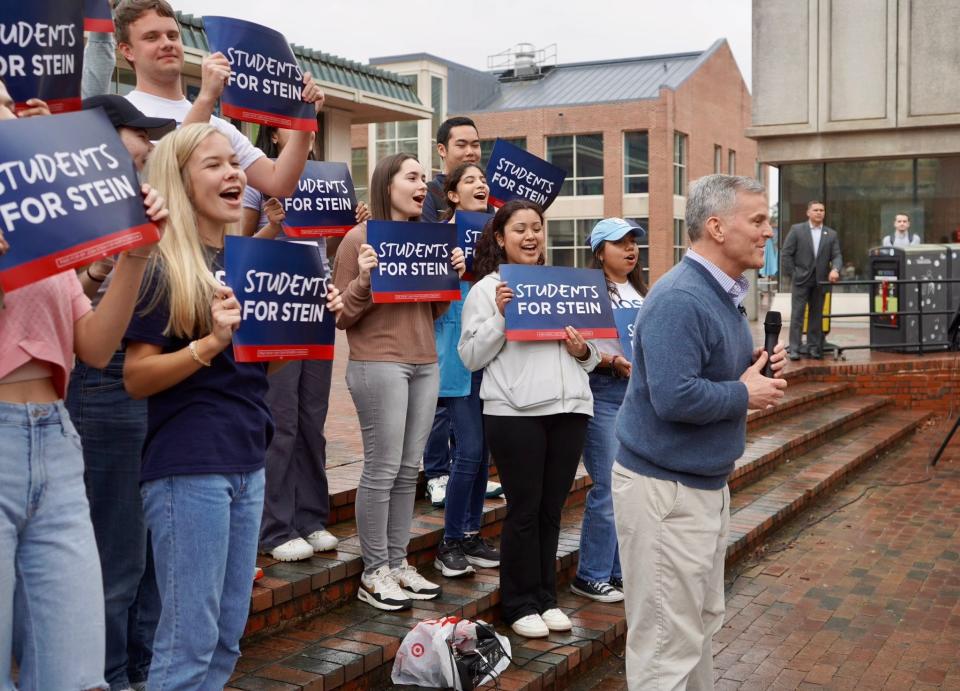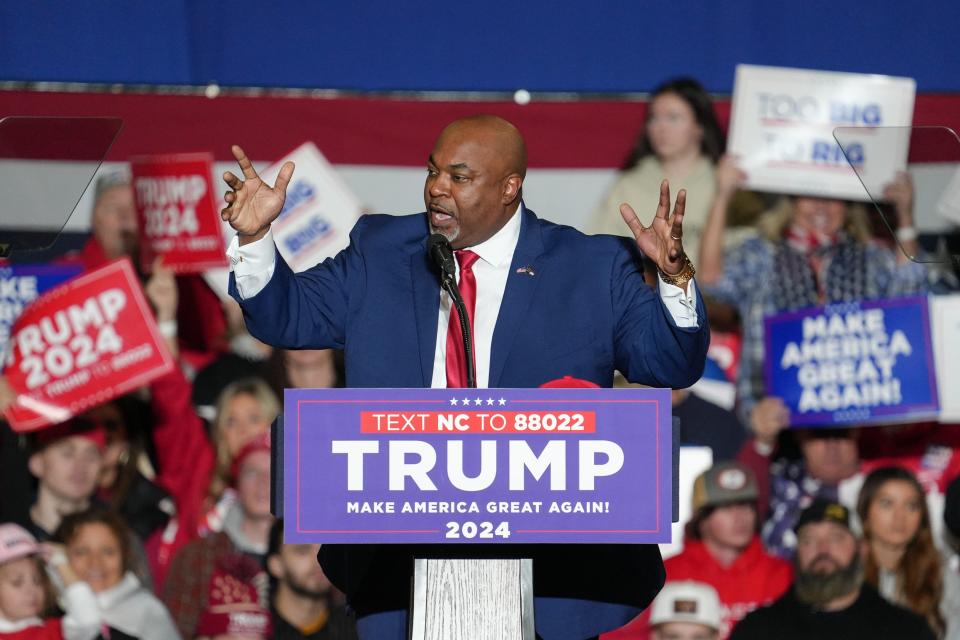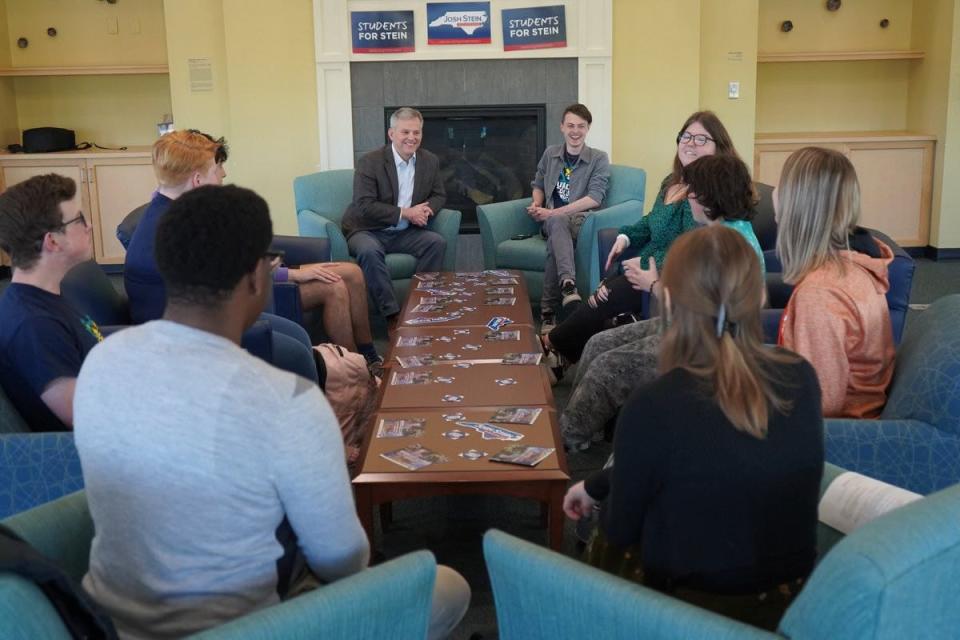Younger voters can influence North Carolina elections. What do they care about?
- Oops!Something went wrong.Please try again later.
- Oops!Something went wrong.Please try again later.
With North Carolina being considered a purple state, every vote counts. And the state’s young voters could be a powerful voting bloc in November.
“I think young voters in North Carolina specifically are casting one of the most powerful ballots in 2024,” said Sloan Duvall, president of the University of North Carolina at Chapel Hill Young Democrats and chair of Students for Stein.
The competitive nature of the races in the state should be encouraging to college-aged voters and send a strong message to any candidate running in the state, she said.
"And these candidates know that they are not going to win if they don’t have young people behind them in North Carolina,” Duvall said.
As of Super Tuesday, there were 953,592 young voters – those between the ages of 18 and 25 – registered in North Carolina. Of those, 73,560 cast a ballot in the primary. Young voters made up about 4% of those who voted in the presidential primary.

In the 2020 general election for president, 587,340 young voters cast ballots, which could have influenced the outcome. In that election, Donald Trump won the Tar Heel state over Joe Biden by about 74,500 votes, or 1.34%.
College students have the numbers to take hold of this election, Duvall said.
Likewise, Emily Stack, North Carolina Young Republicans chair, said this election will have lasting impacts on young voters.
“Things that happen in this election are affecting us not only now, but they will be affecting us obviously the most long-term out of all the age groups,” Stack said.
The Center for Information and Research on Civic Learning and Engagement’s Youth Electoral Significance Index ranked North Carolina as one of 10 states in which the youth vote could impact the presidential race the most.
Courting young voters
It’s not just the presidential race that could feel the effects of young voters. Others are taking note and targeting this voting bloc.
For example, Democratic gubernatorial candidate and current Attorney General Josh Stein launched Students for Stein. He’s been traveling to universities and community colleges across the state to talk to students.
In an interview, Stein said some common threads have emerged.
“The issues that young people care about are on the ballot this November,” Stein said. “Reproductive freedoms are on the ballot. Voting rights are on the ballot. Gun violence protection is on the ballot. Public education is on the ballot. A thriving economy is on the ballot, and I want to create a future where young people in North Carolina can succeed.”
If North Carolina elects Republican gubernatorial candidate Mark Robinson, the state could slide backward, he said.
“It will have real damage to the future prospects of North Carolina,” Stein said.

Robinson’s campaign did not respond to multiple requests for comment about how he’s approaching young voters.
Cody Miller, a junior at Appalachian State University and the chairman of the North Carolina Federation of College Republicans, said opinions are positive for Robinson.
“Young conservatives are really fired up for Mark Robinson,” Miller said. “He evokes a similar fire, and passion in young conservatives that I see similar to only somebody like Donald Trump that gets up on stage.”
While Robinson has not made a visit to Miller’s campus this election cycle, Miller still thinks young Republicans feel excited by Robinson.
“We entirely understand that university systems, most colleges are predominately Democrat or liberal,” Miller said. “And that is not necessarily where a huge base is.”
A hard-to-reach voting bloc
Despite this voting bloc’s potential power, historically young voters have the lowest registration rates. In 2020, the North Carolina State Board of Elections reported that 13% of young voters were registered. In comparison, 40% of those aged 41-65 were registered.
Voter turnout is also low in this age group compared to older age groups. Sixty percent of registered young voters turned out in 2020 whereas 84% of voters aged 66 or older voted.
College students may face unique barriers when registering and voting. For example, out-of-state students must choose to register in North Carolina or in their home state. If they are present in their college’s community and plan to stay in North Carolina after graduating, they can register here, according to the North Carolina State Board of Elections. However, if the student plans on returning home after graduating, they should stay registered in their home state.
Additionally, students who moved to a different county for college may need to pay extra attention to their polling location, according to Jake Smith, a junior at the University of North Carolina Wilmington and the president of the UNCW Democrats.
“That's why we’re doing a big push to get people to vote and to get people to register to vote in New Hanover County, in Wilmington where they’re going to school,” Smith said.
Issues top of mind for young voters
According to the Center for Information and Research on Civic Learning and Engagement’s Pre-2024 Election Youth Survey, young voters surveyed are most concerned about the economy.
“While young people’s views and action on social issues like abortion and gun violence often garner the most attention, and remain highly salient, young people are sending a clear message that their primary concern is the economy,” according to the survey. “53% chose the cost of living/inflation among their three top issues, followed by jobs that pay a living wage (28%), addressing climate change, and gun violence prevention (both 26%).”
Smith said students at UNCW are concerned about raising the minimum wage and housing affordability.
Stack echoed this concern from a Republican perspective saying college students are especially concerned about entering the work force after graduating.

“People are coming out of college, and they’re like what am I gonna do?” Stack said. “It’s a hard job market. Where am I going to work? On top of that, everything is blown up in price.”
Young voters also care about social issues. Miller said there is a misconception that Republicans only care about money and the economy, but in his role, he has noticed that social issues are actually what get young Republicans fired up.
“They of course think that the economic issues are bad, but they believe that they will lose their nation sooner to a complete cultural reshaping of our country long before the economy busts,” Miller said.
Reproductive rights are a big issue for Democratic voters at UNC-Chapel Hill, Duvall said. Robinson’s stance on banning abortion has stirred conversation about post-graduate plans, Duvall said, adding that she’s not sure whether she’d stay in the state after graduation if Robinson wins.
Recent polling shows an extremely tight race between gubernatorial candidates Robinson and Stein. According to a Marist Poll conducted in March, Stein and Robinson are only separated by 2 percentage points.
This article originally appeared on Asheville Citizen Times: Presidential election: Young voters in NC play role in November

